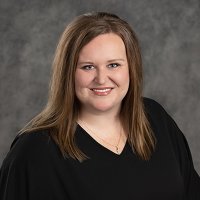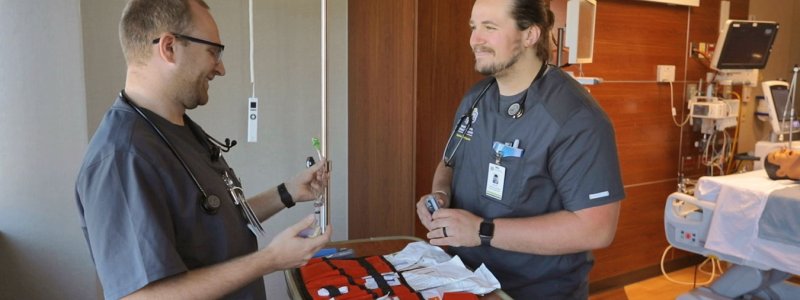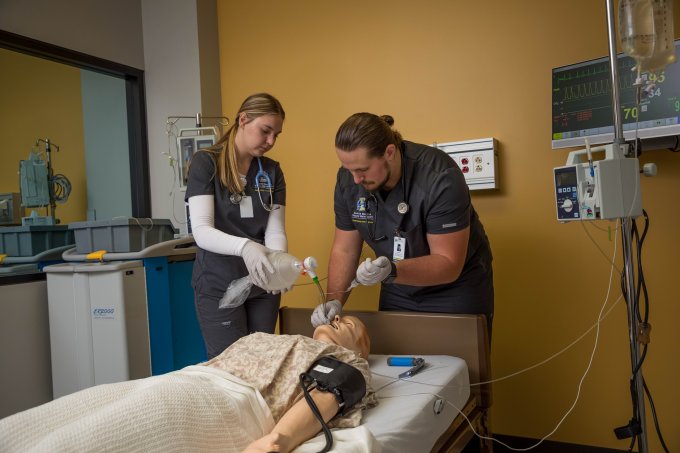About Respiratory Care
Breathing is a privilege many people may take for granted. However, those with cardiopulmonary diseases know just how hard breathing can be. At SDSU, students can become a registered respiratory therapist (RRT) and help patients breathe easier.
Now is a good time to become respiratory therapist in South Dakota. South Dakota’s health care industry is projected to add 6,472 workers to the state’s economy between 2018 and 2028. The rate of growth is projected to be 11.3%, much faster than the 7.1% projected for all industries. Additionally, the U.S. Bureau of Labor Statistics projects a 14% growth in the respiratory therapy from 2021 to 2031, with about 9,400 job openings projected each year. Median Pay for a respiratory therapist is $70,540 per year or $33.91 per hour.

BREATHE-SD Scholarship for students pursuing the A.S. in respiratory care
BREATHE-SD is an HRSA grant-funded project focused on increasing and strengthening the respiratory care and public health workforce in South Dakota.
Through BREATHE-SD, half-tuition scholarships are available to students pursuing an A.S. in respiratory care at SDSU. All A.S. degree requirements also count toward the B.S. in respiratory care.
There is no separate application for the BREATHE-SD scholarship. Students simply need to apply to the A.S. in respiratory care program and they will be automatically considered for the half-tuition BREATHE-SD scholarship.
Explore Our Programs
The respiratory care program offers associate and baccalaureate respiratory care degrees. Graduates demonstrate competence in the cognitive, psychomotor and affective learning domains of respiratory care practice, to prepare and perform as registered respiratory therapists.
FAQs
Enrollment for the respiratory care program is limited to 40 students. There is no limit for enrollment in the pre-respiratory care program.
Labor department statistics major growth in the health care industry and the report on respiratory therapy should really put wind in the sails of potential respiratory therapists.
South Dakota’s health care industry is projected to be among the largest growth industries through 2028, according to the Labor Market Information Center within the South Dakota Department of Labor and Regulation. The industry is projected to add 6,472 workers to the state’s economy between 2018 and 2028. The rate of growth is projected to be 11.3%, much faster than the 7.1% projected for all industries. Further information on employment trends and average salary are available online.
You will also have access to seminars and conferences, like the South Dakota Society for Respiratory Care (SDSRC). You can build your resume and network with potential employers by sitting on the SDSRC board of directors as a student representative. In addition, SDSRC offers scholarships and opportunities to attend the American Association for Respiratory Care conferences.
Students complete their second professional year at Monument Health in Rapid City, or Avera McKennan Hospital in Sioux Falls, Sanford USD Medical Center in Sioux Falls, Huron Regional Medical Center in Huron, Madison Regional Health System in Madison or Brookings Health System in Brookings.
Students will develop skills and master concepts in:
- Patient assessment
- Neonatal care
- Hemodynamic analysis
- Ventilator management
- Emergency and trauma
- Pulmonary diagnostic testing
- Disease management
- Respiratory pharmacology
Students in the respiratory care program are exposed to advanced technology and the latest respiratory equipment, including:
- Ventilators
- Ultrasound
- Blood analyzing machines
- Medical charting systems
BREATHE-SD is an HRSA grant-funded project focused on increasing and strengthening the respiratory care and public health workforce in South Dakota.
Through BREATHE-SD, half-tuition scholarships are available to students pursuing an A.S. in respiratory care at SDSU. All A.S. degree requirements also count toward the B.S. in respiratory care.
There is no separate application for the BREATHE-SD scholarship. Students simply need to apply to the A.S. in respiratory care program and they will be automatically considered for the half-tuition BREATHE-SD scholarship.
Avera Health, Monument Health, Sanford Health and SDSU, partnering with the Northern Plains Health Network, are each providing unique incentives including scholarships, sponsorships and sign-on bonuses for those wanting to become a respiratory therapist.
Accreditation
The South Dakota State University Respiratory Care Program, program numbers 200070 (Base Program) and 300015 (Satellite Program), granting the degree of Associate of Science in Respiratory Care, base program located on the campus of South Dakota State University and satellite program located on the campus of Monument Health Rapid City, is accredited by the Commission on Accreditation for Respiratory Care (CoARC).
CoARC accredits respiratory therapy education programs in the United States. To achieve this end, it utilizes an "outcomes-based" process. Programmatic outcomes are performance indicators that reflect the extent to which the educational goals of the program are achieved and by which program effectiveness is documented. Program outcomes data is available on CoARC.
For more information, contact:

Marissa Trosen
Interim Director of Respiratory Care Program/Instructor
Department of Allied and Population Health



